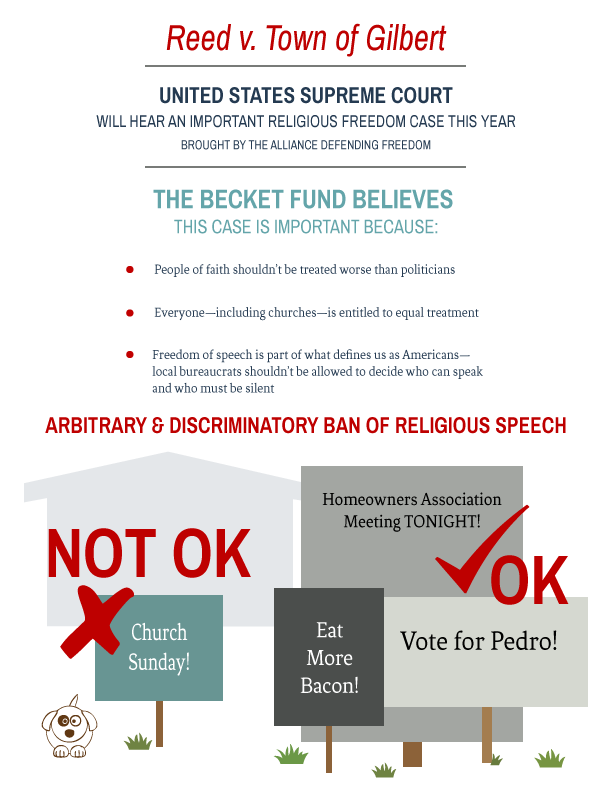Media Advisory: Supreme Court to hear religious speech case on January 12th Arizona town’s ordinance allows signs for politicians, but not for churches, mosques or synagogues
Media Contact
Ryan Colby 202-349-7219 media@becketlaw.org
Additional Information

Washington, D.C. – The U.S. Supreme Court’s first oral argument of 2015 will be the First Amendment case regarding an Arizona town’s arbitrary discrimination toward religious speech. The town of Gilbert imposes strict regulations on the size and duration of church sidewalk signs, yet not on political, ideological, or other noncommercial signs. Small houses of worship rely on signs to invite people in the community to their services, but face fines and possible jail time for practicing their freedom of speech. Alliance Defending Freedom is representing Good News Community Church and Pastor Clyde Reed from this unfair ordinance. On September 2014, Becket filed a friend-of-the-court brief in this case and will be available for comment immediately after the hearing.
Who:
Alliance Defending Freedom, Representing Good New Community at the US Supreme Court Becket, filed friend-of-the-court brief, and will be available for comment outside the court and following the hearing
What:
Oral Argument in Reed v. Town of Gilbert
When:
Monday, January 12, 2015 at 10:00 a.m.
Where:
Supreme Court of the United States
1 First Street Northeast
Washington, DC 20543
For more information or to arrange an interview with a Becket attorney, please contact Melinda Skea at media@becketlaw.org or 202.349.7224.
###
Becket is a non-profit, public-interest law firm dedicated to protecting the free expression of all religious traditions. For over 20 years, it has defended clients of all faiths, including Buddhists, Christians, Jews, Hindus, Muslims, Native Americans, Sikhs, and Zoroastrians. Its recent cases include two major Supreme Court victories: the landmark ruling in Burwell v. Hobby Lobby, and the 9-0 ruling in Hosanna-Tabor v. EEOC, which The Wall Street Journal called one of “the most important religious liberty cases in a half century.”